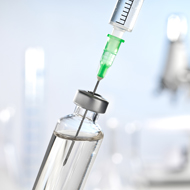'Innovation needed' in animal vaccines

The report considers the barriers to modern vaccine use, including the regulatory process.
Vaccination is seen as the biggest breakthrough in animal health in the last 100 years, according to a recent survey, but leading experts say greater innovation is needed to improve outcomes.
A new report authored by Oxford Analytica examines the future of the animal health sector, based on discussions held at a recent HealthforAnimals roundtable meeting.
Among other topical issues, the report considers the barriers to modern vaccine use, including the regulatory process. While such barriers can often be overcome in an emergency, the system as a whole needs to be streamlined, the Innovation in animal health report says.
'Coopetition' is something that is already happening in other sectors and authors say this could have a place in developing vaccine technology. It is cooperation between companies that share a goal, as well as the risks, costs and data.
In the case of the 2014 Schmallenberg outbreak, many companies were cautious about investing in vaccine innovation until several companies undertook similar projects in parallel. According to the report, coopetition would allow for quicker vaccine development and is a better use of funding.
Gregorio Torres from the World Organisation for Animal Health (OIE) advocates a greater allocation of funding for vaccine banks which hold ready-to-use vaccines and/or antigen components that can be formulated as needed.
To improve management of these banks, OIE has created a new concept of virtual rolling stocks. Selected suppliers would produce vaccines on demand or they remain with suppliers at their own risk and are renewed on a rolling basis.
Dr Torres said this strategy is very important for the timely procurement of high quality vaccines.
Commenting on the report's conclusions, Carel du Marchie Sarvaas from HealthforAnimals, said: "Vaccination has profoundly influenced and improved the health of both animals and people globally, and it will continue to be a fundamental tool to meet future health challenges.
"It has eliminated smallpox in people and can control many other diseases against which no other treatment exists, such as human polio, foot-and-mouth disease in cattle and rabies in people and animals.
"Prevention is better than cure so it is vital we inject innovation into this field to ensure its growth."
Innovation in animal health also explores other topics highlighted by the roundtable discussion, including food safety and sustainability, zoonotic and vector-borne disease and innovation in pet health. Read the full report here: http://healthforanimals.org/innovation-in-animal-health/



 The latest
The latest